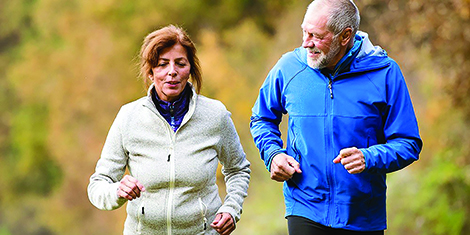When was the last time you touched your toes? Climbed a ladder without feeling shaky? Tried something new? As you get older, some of these things are harder to do. But there are steps you can take to age well and enjoy a better quality of life. Here are six:
- Talk to your healthcare team.
Your doctors and nurses are not only there to diagnose and advise, but also to listen. “The more we can talk about what matters to you — really matters — the better we can support you in reaching your goals, and the better your care will be,†says Dr. Matt Handley, a family physician, whose practice is at Kaiser Permanente’s Capitol Hill campus in Seattle.
Make notes before your doctor visit so you don’t forget any questions. Be as open as possible with your questions — including issues around sexual health.
“As we age, it’s important that patients and doctors are open and ready to discuss this,†says Dr. Jane Dimer, chief of women’s health for Kaiser Permanente Washington. “After all, this is an important component of a good, intimate relationship.â€
- Even a little exercise helps a lot
No doubt your doctor has told you how important it is to exercise. If you’re not exercising regularly, a good first step is to figure out why, and then develop a strategy to overcome that barrier. Here are some common problems and solutions:
- Do you have a hard time maintaining an exercise program? Then try to work exercise into your daily routine. When possible, walk or bike to your destination rather than drive. Take the stairs instead of the elevator. Meet a friend for a walk rather than lunch.
- Chronic pain. Talk to your doctor about pain relief, but also focus on what you can do rather than what you can’t. Gentle yoga, a walk in the fresh air, or an easy-on-the-joints water exercise class may be right for you when a round of golf or running a 10K isn’t.
- Exercise can improve your balance and keep you from falling. Until you’re stronger, try swimming, riding a stationary bike, or using walking poles while on a hike.
- Fear of injury or making a chronic condition worse. Talk with your doctor about what you can do safely.
- Make yourself a priority
Eat well. Our bodies change as we age, and that means how much we eat, what we eat, and what tastes good may change, too. The Mediterranean diet, which includes healthy fats such as olive and nut oils, is recommended for all ages. Depending on your health status, you may need to eat more of some things — like food with fiber — and less of others, like food high in sodium and animal fats.
Limit alcohol. Drinking can affect nutrition, balance, judgment, and reflexes. Heavy drinking can also cause dementia. Doctors recommend that women don’t exceed one drink a day, and that men don’t exceed two. What’s a “drink� Six ounces of wine, 12 ounces of beer, one ounce of liquor.
Break your tobacco habit. If you’re still smoking or chewing, it’s time to quit. Quit for Life, a program available to Kaiser Permanente Washington members, is one of the most effective programs around.
Sleep well. Your doctor has probably already mentioned this: All adults need six to eight hours of sleep a night for their best health. “Lack of sleep depresses our immune system, can increase confusion, affects our mood and concentration, and can lead to falls,†says Dr. David Lewis, a pulmonary specialist in sleep medicine.
- Improve your outlook
Even if you usually see the glass as half full, sometimes life can get you down. A positive outlook, however, is important to well-being. Easier said than done? Maybe, but acting on these tips will help put you on an upbeat path:
- Socialize and connect. Join a friend for lunch, do some volunteer work, take a class at a community center, or gather with a group for morning coffee.
- Lower your stress. Exercise, meditation, laughter, and listening to music will help keep stress in check.
- Get help managing chronic pain.
- Replace negative thoughts with optimistic or realistic ones. Instead of “I’ll never be able to do that,†say, “I’ll try to do that. What do I have to lose?â€
- Talk to your doctor if you’re experiencing anxiety or depression. They are not an inevitable part of aging; they can be effectively treated.
- Take control of incontinence issues
If you have a bladder control issue, you may be embarrassed to discuss it with your doctor. Take heart, because there are solutions.
Whether you have stress incontinence (leakage when you sneeze, laugh or exercise), urge incontinence (an urgent need to urinate), or some other form of bladder control problem, keep a journal of symptoms. Talk about your symptoms when your doctor asks, or bring them up yourself. And describe all your symptoms including discomfort, irritation, pattern, and frequency. Solutions will vary depending on what type of bladder issue you’re experiencing but can include exercises, medication, or surgery.
- Stand on your own two feet
Changes in muscle tone from lack of use may affect your balance. Poor balance and muscle tone can lead to falling, broken bones, sprains, or other injuries. These tips will help prevent falls and the injuries that come with them:
- Improve your balance with exercises.
- Make sure home lighting is adequate indoors and outdoors. Install handrails along stairs and in the shower and bath. Remove loose carpets or other materials that may cause you to trip. Place non-slip mats in the bathroom.
- Wear sturdy shoes with non-slip soles.
- If you feel unsteady, or your doctor recommends it, use a walking aid until your muscle tone has improved.

Whether it’s jogging, walking or whatever, regular exercise is one of the keys to healthy aging.
Source: Kaiser Permanente, a provider of healthcare and health plans.